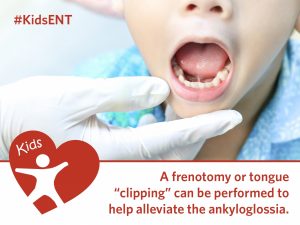Common Reasons to Visit a Pediatric ENT
Saturday, December 28th, 2019
This February, we observe Kid’s ENT Health Month. Children experience a myriad of ear, nose and throat illnesses like ear infections, sinus infections, asthma, allergies, even hearing and speech delays. Many of these issues may be initially handled by your child’s pediatrician. But recurrent illness may need to be referred to your local Pediatric ENT.
Children’s Ear, Nose and Throat Issues
Tongue Tie
From the time of birth, children may need the expertise of an ENT. Last year, we focused on spreading awareness about ankyloglossia, or tongue tie. As infants, children may struggle to breastfeed or even bottle feed due to ankyloglossia, which hinders the movement of the tongue. Increased awareness over the last 20 years has led parents to ENTs to perform a simple corrective surgery called a frenotomy. This in-office procedure has a quick recovery time with a very low risk of complications.
Tympanostomy Tubes
Some children have repeated difficulty with ear infections. With frequent or lengthy bouts of ear infection, your pediatrician may refer you to an ENT for Tympanostomy tubes. Built-up fluid in the ears can lead to temporary hearing loss as well as discomfort. The procedure involves drilling a small hole in the eardrum, suctioning out whatever fluid may be trapped there, and inserting a small tube. These tubes allow air to reach the middle ear, providing relief from the built-up pressure.
Snoring and Sleep Apnea
Mouth breathing or snoring in children are other indications that a trip to the ENT may be necessary. Nasal obstructions can lead to blocked airways that hinder a child’s breathing. This can exhibit itself as noisy breathing, a runny nose and sleeping with the mouth open. There are various causes for these obstructions such as swelling from allergies or infections, a foreign object, or a deviated septum. Your pediatric ENT will be able to assess the cause and proceed with the proper treatment.

Children who snore experience what’s termed Sleep Disordered Breathing. Two to four percent of those children who snore also experience Obstructive Sleep Apnea. With Sleep apnea, the airways are completely obstructed for a brief period of time, causing the body to behave as though it’s choking. Blood oxygen levels drop, blood pressure rises and sleep is disrupted.
Snoring in children can usually be attributed to enlarged tonsils or adenoids. In children who are overweight, it may be due to fat deposits that gather around the throat and thus narrow the airway. All children who snore experience some level of disrupted sleep.
Improper breathing at night causes poor sleep quality, which can lead to other problems. Irritability, mood swings, hyperactivity, and slow growth can all be attributed to insufficient sleep due to poor sleep quality.
For all these ailments and so many others, we value our Pediatric Ear, Nose and Throat Doctors. Visit our National Wellness Observance Calendar to view other resources on Kids ENT Health to help educate you and your workplace. Our 2020 National Wellness Observance Calendar is Free to Download, so you can stay up to date on other important health observances throughout the year.



